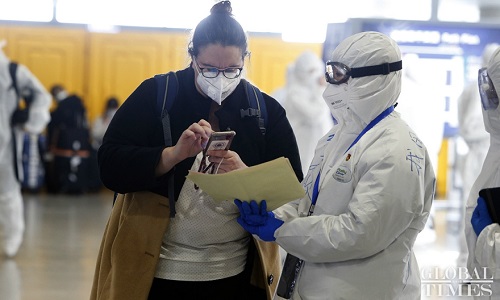HOME >> CHINA
Shanghai guidelines on Dos and Don’ts as the city downgrades emergency response level for COVID19
Source:Global Times Published: 2020/3/23 19:28:40

Shanghai Pudong International Airport enforces stringent measures to prevent the rise of imported coronavirus cases. Photo: Yang Hui/GT
Shanghai will downgrade its emergency response level for COVID-19 prevention control from the first-level to the second-level from Tuesday, authority announced on Monday. Several sectors continue to resume operations as COVID-19 visibly wanes in the city. Amid the prevailing prevention and control measures, here are some official Dos and Don'ts on adjusting to the "new normal."
All inbound passengers from 24 key pandemic affected countries are subject to isolation, at home or designated centers, regardless of their nationalities, upon arrival.
The 24 countries include South Korea, Iran, Italy, France, Spain, Germany, the US, the UK, Switzerland, Sweden, Belgium, Norway, the Netherlands, Denmark, Austria, Australia, Malaysia, Greece, Czech Republic, Finland, Qatar, Canada, Saudi Arabia, and the Philippines
Before approval for home isolation, inbound travelers must take the nucleic acid test for novel coronavirus and test negative.
Those quarantined at home must not share the same apartment with people not in isolation.
Individuals stepping out without due authorization during the home isolation period will be given administrative punishment, in accordance with the law, that might amount to criminal prosecution.
All inbound passengers quarantined at designated centers must pay their own accommodation and food expenses. They can choose from two available packages : 200 yuan ($28.11) per day or 400 yuan per day.
Inbound passengers without medical insurance have to bear their medical expenses for COVID-19 treatment in Shanghai by themselves. People who are not medically insured and face difficulties may be given medical assistance in accordance with laws and regulations.
In case of symptoms like fever or cough during isolation, individuals are mandated to report to the medical staffers immediately.
Inbound passengers from less-affected pandemic countries will be allowed to check in a hotel, upon furnishing green health code and passport details.
Inbound arrivals who conceal their health status or provide false information, will be prosecuted
It is advisable to cancel all non-essential outbound travel plans during this pandemic period.
If the visa or residence permit of a foreign talent expires and the individual does not leave the country, he/she may apply for a work permit in China within the automatic extension period stipulated by the immigration department.
People traveling to other Chinese cities are suggested to download a national health code, which can show their health status.
Personal information will not be leaked through health code scanning.
It is compulsory to wear masks on trains. Commuters are not allowed to carry alcoholic disinfectants, chlorine-based disinfectants, and bleaching powder on trains. Limited quantities of disinfection wipes for personal use are allowed.
Enterprises are encouraged to adopt flexible working hours, remote working, or work-from-home mode to allow their employees to take care of their children.
For employees who are unable to return to work temporarily due to the pandemic, the employers shall not terminate the labor contract or end services of contract workers.
People having meals in office canteens or restaurants are suggested to maintain a safe distance from each other, avoid touching mobile phone while eating, use separate serving chopsticks and spoons, and use electronic payment mode instead of cash.
It is safe to eat uncooked food like Japanese sashimi, as long as they are produced and sold by qualified manufactures with adherence to the specified requirements.
Take-away food from qualified restaurants is generally safe to eat.
Wear a mask, wash and sanitize hands before and after trying outfits during shopping, as novel coronavirus is mainly transmitted through droplets and contact.
There is no need to disinfect the goods purchased from supermarkets, as novel coronavirus has a limited life span in vitro and there's a very slim possibility of contamination of items in the supermarket by patient's saliva.
Make sure to exercise self-protection, whenever a medical diagnosis for lung functions is necessary.
People can take off the mask in well-ventilated spaces, homes or outdoors, or when in less crowded places.
Posted in: SOCIETY